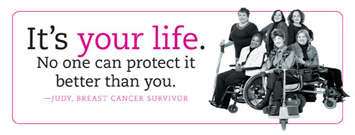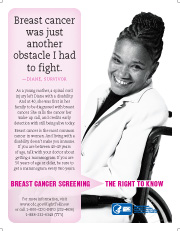Breast Cancer and Women with Disabilities
 New recommendation: If you are between 40-49 years old, talk to your doctor about when and how often to get a mammogram. If you are 50-74 years old, get a mammogram every two years.
New recommendation: If you are between 40-49 years old, talk to your doctor about when and how often to get a mammogram. If you are 50-74 years old, get a mammogram every two years.
Breast cancer is the most common cancer in women. And living with a disability does not make you immune. During Breast Cancer Awareness Month in October, learn the facts about breast cancer and why screening should be a regular part of your health care.
In the United States in 2008, women with a disability aged 50-74 reported a lower rate of mammography use than women without a disability of the same ages (78.1% vs. 82.6%).1
Studies also show higher rates of death related to breast cancer among women with a disability, even when diagnosed at the same stage as women without a disability. 2 Having regular mammograms can lower the risk of dying from breast cancer.
Diane's Story
“My name is Diane. I'm an African American female. I'm 51 years old. When I was 24 I became physically challenged with three young children. (My baby was nine months old.) My mobility is with the use of a wheelchair and a walker for short distance. Becoming physically challenged wasn't enough for me. I guess I needed another wake up call to really live life.
“I was diagnosed with breast cancer when I was 40. It doesn't run in my family. So I was very surprised. Breast cancer is definitely not a death sentence. It's a wake up call. It makes you aware of just how fragile life can be and you also become aware of the things that you have to do in order to survive. You have to be your own advocate. This is your health. This is your life. Demand everything that you need, because you can't take shortcuts with breast cancer.
“Early detection is the key. It's the key to whether you're going to live or die. And you can't detect it if you don't go for the screenings. You may not have breast cancer. You may be fortunate. You may be one of the blessed ones. But you won't know unless you have the screenings. It can happen to you-I'm proof of that. Catching it when I did catch it, that's why I'm alive today. I'm ecstatic to be alive.
“My final words to women with any type of physical disability is that you've come this far and it hasn't been easy. You've overcome what you had to overcome, you're still alive and you're still functioning. And that in itself shows you that you have the strength to do what you have to do for yourself. You have to take that strength or dig deep inside and find the strength to really take care of yourself. You know you deserve this. We deserve this. From where I'm sitting breast cancer screening is the key to living.”
CDC would like to thank Diane for sharing this personal story.
Tips for Women with Disabilities
As a woman living with a disability, you may face a number of challenges that make it difficult to get a quality mammogram and clinical exam. Here are some questions you can ask when scheduling your mammogram that can help you prepare for your appointment:
- How should I dress?
- How do I prepare if I use a wheelchair or a scooter?
- Can the machine be adjusted so I can remain seated?
- How long is the appointment and can I have additional time if I need it?
Let the scheduling staff, radiology technicians, or radiologist know that you can/cannot:
- Sit upright with or without assistance.
- Lift and move your arms.
- Transfer from your chair/scooter.
- Undress/dress without assistance.
When preparing for your mammogram, remember:
- Wear a blouse that opens in the front.
- Wear a bra that you can remove easily.
- Do not wear deodorant or body powder.
- If you have any disability-related concerns, discuss them with your primary care physician, women's health specialist, radiologist, physician's assistant, or other health care professional.
For more information about the kinds of tests used to screen for breast cancer, and to learn how you can be screened, see Screening.
Where Can I Go to Get Screened?
Mammograms are performed at clinics, hospitals, and doctor's offices. For help scheduling an appointment, call your doctors' office.
Will My Health Insurance Pay for My Mammogram?
Most health insurance companies and Medicare and Medicaid plans cover the cost of screening mammograms. Check your insurance coverage guidelines for more details.
Are you worried about the cost or currently don't have health insurance? CDC's National Breast and Cervical Cancer Early Detection Program (NBCCEDP) offers free or low-cost mammograms and education about breast cancer. Find out if you qualify.
More Information
- CDC's Campaign: "Breast Cancer Screening: The Right to Know."
- Free Flyers, Fact Sheets, and Dissemination Guide
- CDC's Disability and Health
- Tip Sheets (PDF) in English [PDF - 687KB] and Spanish [PDF - 674KB]
- Basic Breast Cancer Information
- Breast Cancer Screening
- U.S. Preventive Services Task Force Summary of Recommendations on Breast Cancer Screening
- The Official U.S. Government Site for Medicare
Get email updates
To receive email updates about this page, enter your email address:
Contact Us:
- Centers for Disease Control and Prevention
1600 Clifton Rd
Atlanta, GA 30333 - 800-CDC-INFO
(800-232-4636)
TTY: (888) 232-6348 - Contact CDC-INFO




